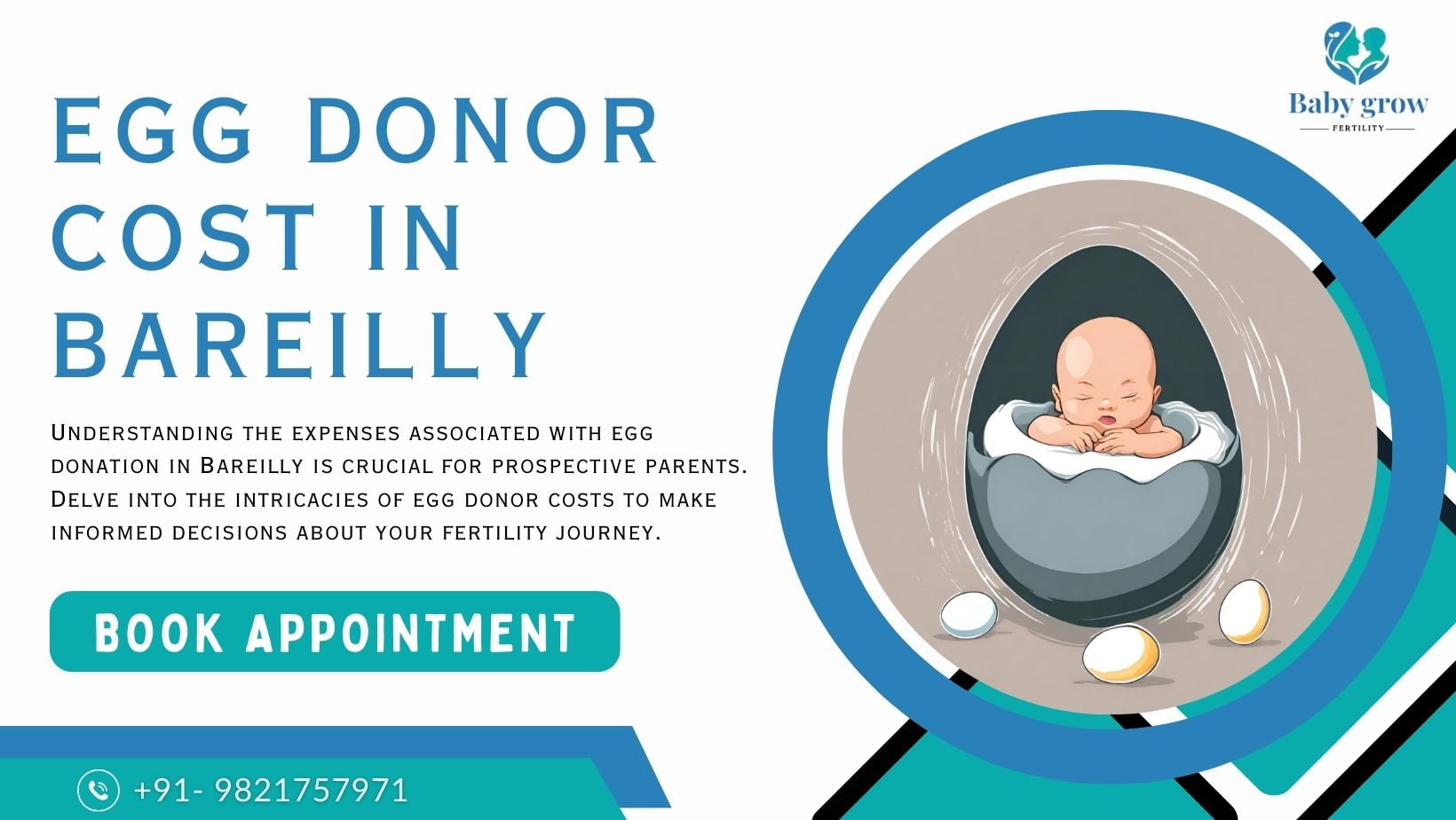Looking to explore egg donation options in Bareilly? Understanding the egg donor cost in Bareilly is crucial for those considering this path to parenthood. Egg donation offers hope to individuals or couples struggling with infertility or genetic disorders, providing them with the opportunity to build their families.
In Bareilly, the cost of egg donation varies depending on several factors, including the clinic, the experience of the donor, medical screenings, and any additional services included in the package. Typically, the cost covers the donor’s compensation, medical tests, fertility medications, and the procedures involved in the egg retrieval process.
It’s essential to thoroughly research clinics in Bareilly offering egg donation services and inquire about their pricing structures and what is included. Additionally, discussing any financial concerns or available payment plans with the clinic can help individuals or couples make informed decisions about pursuing egg donation.
Understanding the egg donor cost in bareilly is the first step towards embarking on the journey of egg donation and realizing the dream of parenthood.
What is egg donor?
Egg donation is a fertility treatment where a woman (the donor) provides her eggs to be used by another individual or couple (the recipient) who are unable to conceive using their own eggs. These eggs are typically fertilized with sperm through in vitro fertilization (IVF) techniques, and the resulting embryos are transferred to the recipient’s uterus to achieve pregnancy. Egg donor offers hope to individuals or couples facing infertility due to various reasons, such as advanced maternal age, diminished ovarian reserve, or genetic disorders.
The Process of Egg Donation
Initial Consultation and Screening: The egg donation process begins with an initial consultation with a fertility specialist or reproductive endocrinologist. During this consultation, the prospective donor undergoes a comprehensive medical evaluation, including a physical examination, review of medical history, and testing for infectious diseases, genetic disorders, and ovarian reserve. Psychological screening may also be conducted to assess the donor’s mental and emotional readiness for donation.
Matching with Recipients: Once cleared for donation, the donor is matched with recipients based on various criteria, including physical characteristics, ethnic background, educational background, and desired level of contact between parties. The matching process aims to find the most suitable donor-recipient match while respecting the preferences and privacy of both parties. In some cases, donors and recipients may choose to remain anonymous, while others may opt for known or semi-known donation arrangements.
Ovarian Stimulation and Monitoring: To stimulate the production of multiple eggs, the donor undergoes ovarian stimulation using fertility medications, typically administered through daily injections over a period of about 10-14 days. During this time, the donor’s ovarian response is closely monitored through blood tests and transvaginal ultrasound examinations to adjust medication dosages as needed and prevent complications such as ovarian hyperstimulation syndrome (OHSS).
Egg Retrieval Procedure: Once the follicles containing mature eggs reach the optimal size, the donor undergoes a minor surgical procedure called egg retrieval, typically performed under sedation or general anesthesia. Using transvaginal ultrasound guidance, a needle is inserted into each ovarian follicle to aspirate the fluid containing the eggs. The entire procedure usually takes about 15-30 minutes, and the donor can typically return home the same day.
Post-Retrieval Care and Recovery: Following egg retrieval, the donor may experience mild cramping, bloating, or vaginal spotting, which are common and usually resolve within a few days. The donor is advised to rest and avoid strenuous activities for the remainder of the day. Pain medications may be prescribed as needed for comfort. Regular follow-up appointments may be scheduled to monitor the donor’s recovery and address any concerns. It’s essential for donors to take care of their physical and emotional well-being during the recovery period.
Who may need egg donor?
Egg donor may be sought by individuals or couples who are unable to conceive using their own eggs due to factors such as advanced age, poor egg quality, premature ovarian failure, or genetic conditions that could be passed on to offspring. This includes women who have undergone cancer treatment affecting their fertility or those with a history of recurrent pregnancy loss. Same-sex male couples and single men desiring biological children may also require egg donor to achieve parenthood.
Egg Donor Cost in Bareilly
Exploring egg donor in bareilly? Understanding the associated costs is vital. In Bareilly, the egg donor cost typically ranges from INR 50,000 to INR 1,50,000. This encompasses various aspects such as medical assessments, donor compensation, and clinic fees. Prices may vary based on the clinic’s reputation, the donor’s characteristics, and any additional services required. Additionally, the cost may include screening tests for both the donor and the recipient, along with legal fees to formalize agreements. Prospective parents should research and compare clinics to understand the breakdown of costs and available services. Despite the expenses, many clinics offer financing options to assist individuals in realizing their dream of parenthood.
Factors Affecting Egg Donor Cost
Clinic or agency fees: The cost of egg donation can vary significantly based on the fees charged by the clinic or agency facilitating the process. Different clinics and agencies may have varying fee structures, which can include administrative fees, consultation charges, and facility usage fees. These fees cover the overhead costs of running the clinic or agency, including staffing, equipment, and facilities maintenance.
Donor compensation: Another significant factor influencing egg donor cost is the compensation provided to the egg donor. This compensation is intended to compensate the donor for their time, effort, and any inconvenience incurred during the donation process. The amount of compensation can vary depending on factors such as the demand for donors, the donor’s characteristics, and regional regulations governing donor compensation.
Medication and medical expenses: Egg donation involves several medical procedures and medications to stimulate the donor’s ovaries, monitor follicle development, and retrieve the eggs. The cost of these medications and medical procedures can contribute significantly to the overall cost of egg donation. Expenses may include hormone injections, ultrasound monitoring, blood tests, anesthesia, and the egg retrieval procedure itself.
Legal and administrative costs: Egg donation requires legal agreements to protect the rights and responsibilities of both the donor and the recipient. Legal fees associated with drafting and reviewing these agreements can add to the overall cost of the process. Additionally, there may be administrative costs related to coordinating appointments, managing medical records, and ensuring compliance with regulatory requirements. These legal and administrative expenses are essential for ensuring a smooth and legally sound egg donation process for all parties involved.
Legal Aspects and Contracts
Legal aspects and contracts in egg donation ensure clarity and protection for all parties involved, outlining rights, responsibilities, and key components of agreements to safeguard interests throughout the process.
Importance of legal agreements in egg donation
Legal agreements play a crucial role in egg donation, serving to protect the interests and rights of all parties involved – the egg donor, the intended parents or recipients, and the clinic or agency facilitating the donation. These agreements outline the terms and conditions of the arrangement, ensuring clarity and transparency throughout the process. Without a legally binding agreement, disputes and misunderstandings may arise, potentially leading to legal complications and emotional distress for all parties.
Key components of an egg donor agreement
An egg donor agreement typically includes several key components to address various aspects of the donation process comprehensively. These components may include details about confidentiality and privacy protections, the responsibilities and obligations of each party, financial arrangements including compensation and reimbursement for expenses, as well as provisions for medical procedures, potential risks, and liabilities. Additionally, the agreement may cover issues related to future contact between the donor and any resulting children, as well as the legal parentage of the offspring.
Rights and responsibilities of donors and recipients
In the context of egg donation, both donors and recipients have specific rights and responsibilities outlined in the legal agreement. Donors have the right to comprehensive medical care and support throughout the donation process, as well as the assurance of confidentiality regarding their personal information. They also have the responsibility to provide accurate medical history and adhere to the protocols set forth by the clinic or agency. Recipients, on the other hand, have the right to receive viable eggs for their fertility treatment, along with the assurance of legal parentage of any resulting children. They are responsible for compensating the donor for their time, effort, and any associated expenses, as well as adhering to any stipulations regarding the use of the donated eggs. Overall, these legal agreements aim to protect the rights and interests of all parties involved in the egg donation process, fostering a clear and mutually beneficial arrangement.
Conclusion
In conclusion, understanding the costs associated with egg donation in Bareilly is essential for individuals considering this fertility option. By exploring factors such as clinic fees, donor compensation, and legal aspects, individuals can make informed decisions about their journey towards parenthood. Despite the financial considerations, the opportunity to build a family through egg donation can be immensely rewarding. It’s crucial to research thoroughly, consult with fertility experts, and consider all aspects before embarking on this path. With the right information and support, individuals can navigate the process with confidence, ultimately realizing their dream of starting or expanding their family.
Frequently Asked Questions (FAQs)
Q1. How does donor compensation work?
Ans:- Donor compensation typically involves a fixed fee or reimbursement for time, inconvenience, and potential expenses. The amount varies based on factors such as location, clinic, and donor experience.
Q2. Are there any risks involved in egg donation?
Ans:- While egg donation is generally safe, risks include potential side effects from medications, complications during retrieval, and psychological impacts. Clinics provide thorough screenings to minimize risks.
Q3. How long does the egg donation process take?
Ans:- The egg donation process typically spans 4-6 weeks, including screening, medical evaluations, ovarian stimulation, egg retrieval, and post-retrieval recovery.
Q4. What happens if the egg donation cycle is unsuccessful?
Ans:- If the egg donation cycle is unsuccessful, recipients may explore other options, such as additional cycles with the same or different donor, alternative treatments, or refund policies offered by the clinic.
Q5. Can I choose the characteristics of the egg donor?
Ans:- Clinics may allow recipients to specify desired characteristics in an egg donor, such as ethnicity, education, and physical traits. However, availability may vary, and not all preferences can be guaranteed.
Q6. What legal protections are in place for donors and recipients?
Ans:- Legal protections for donors and recipients vary by jurisdiction but often include confidentiality agreements, informed consent documentation, and clear outlines of rights and responsibilities in the donor agreement.
Q7. Are there any support services available for egg donors?
Ans:- Many clinics and agencies offer support services for egg donors, including counseling, medical guidance, and resources for emotional well-being throughout the donation process.




